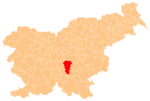Ivančna Gorica
Name
The name Ivančna Gorica literally means 'Ivanko's hill', which is the name of a local hill. While the settlement was still a hamlet, it was known as Pod Ivančno gorico (literally, 'below Ivanko's hill'). Like similar names (e.g., Ivanjkovci, Spodnji Ivanjci, etc.), it is derived from the hypocorism *Ivanko, based on the personal name Ivan 'John'.
History
Ivančna Gorica did not exist as a settlement until 1945, before which it was a hamlet of Stična and Mleščevo. After the Second World War, the spruce forest on Ivanko's Hill (Slovene: Ivančna gorica) was cleared and houses were built. The number of houses in the settlement grew rapidly during the 1960s.
Church and shrine

The parish church in the settlement is dedicated to Saint Joseph and belongs to the Roman Catholic Archdiocese of Ljubljana. A wayside shrine in the centre of the settlement known as the Abbot's shrine (Slovene: Opatovo znamenje) appears on the coat of arms of the municipality. It was a Roman milestone that was recarved in 1583 on the orders of Laurentius Rainer, the abbot of the Cistercian Abbey at nearby Stična.
Notable people
Notable people that were born or lived in Ivančna Gorica include:
- Janez Eržen (1929–2009), theater actor
- Nina Pušlar (born 1988), musician
Economy
Akrapovič, a Slovenian firm manufacturing motorcycle exhaust systems, is based in Ivančna Gorica.
References
- ^ "Naselje Ivančna Gorica". Statistični urad Republike Slovenije. Retrieved February 5, 2020.
- ^ Leksikon občin kraljestev in dežel zastopanih v državnem zboru, vol. 6: Kranjsko. Vienna: C. Kr. Dvorna in Državna Tiskarna. 1906. p. 103.
- ^ "Ivančna Gorica municipal site". Archived from the original on 2020-12-02. Retrieved 2011-07-20.
- ^ Savnik, Roman, ed. 1971. Krajevni leksikon Slovenije, vol. 2. Ljubljana: Državna založba Slovenije, p. 132.
- ^ Snoj, Marko (2009). Etimološki slovar slovenskih zemljepisnih imen. Ljubljana: Modrijan. pp. 170–171.
- ^ "EŠD 700". Registry of Immovable Cultural Heritage (in Slovenian). Ministry of Culture of the Republic of Slovenia. Retrieved 21 July 2011.
External links
 Media related to Ivančna Gorica at Wikimedia Commons
Media related to Ivančna Gorica at Wikimedia Commons- Ivančna Gorica on Geopedia
